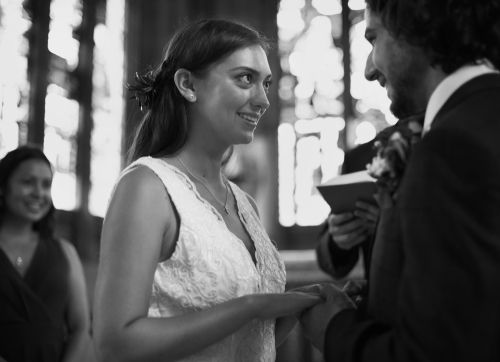 Love is a common human desire and need. It comes in many forms: the bonds between family members, the closeness and care that friends share, and lifelong romantic partnerships. Supporting these forms of love is a common goal among ministers — in fact, it’s the reason many seek ordination. Perhaps you see it as an out-of-reach dream. But becoming an ordained marriage officiant is less complicated than you may think. This quick guide explains what you need to know about solemnizing weddings as an ordained Universal Life Church minister.
Love is a common human desire and need. It comes in many forms: the bonds between family members, the closeness and care that friends share, and lifelong romantic partnerships. Supporting these forms of love is a common goal among ministers — in fact, it’s the reason many seek ordination. Perhaps you see it as an out-of-reach dream. But becoming an ordained marriage officiant is less complicated than you may think. This quick guide explains what you need to know about solemnizing weddings as an ordained Universal Life Church minister.
Who Can Solemnize Weddings?
Depending on the jurisdiction, certain public officials such as judges or mayors can also officiate weddings. But every state allows ordained clergy to solemnize marriages. “Clergy” is a broad term referring to people formally selected for religious service. It’s also not faith-specific: clergy can include Jewish rabbis, Christian pastors, Muslim imams, Hindu pujaris, and Wiccan priestesses. It also applies to ordained ULC ministers.
What Must I Do To Become Ordained?
The ULC offers free online ordination. Through its simple process, you can become a ULC minister marriage officiant in just a few minutes. You’ll just need to follow the instructions on the “Become a Minister” page and wait for a confirmation to arrive in your email.
When completing the online form, you’ll want to keep a few important things in mind. First, you must use your entire legal name. Don’t include nicknames, honorifics, or degree titles and abbreviations. Also, be sure to use correct capitalization and review the form for errors before submission. How you complete your form is how your information will appear on your ordination certificate.
Do I Need To Register as a Minister?
Procedures for getting a marriage minister license differ in each state. Some, such as Ohio, require minister registration at the state level. Officiants ordained by the Universal Life Church or any other organization must apply through Ohio’s Secretary of State office. Others, such as Indiana, do not require officiants to register at all. A few require ministers to register in the counties where they’re performing wedding ceremonies. Check the ULC’s state marriage laws for specifics.
Regardless of whether you’re required to officially register to perform marriages, you should still have your credentials on hand. This ensures you can present proof of ordination if it’s requested by a state or local official. The ULC’s Ministry Supply store offers wedding kits that include an ordination certificate plus a wallet card license. You can also add a notarized letter of good standing to these kits. You may need this letter in certain jurisdictions, so it’s best to check local laws for details.
Which States Present Challenges for ULC Ministers?
Nearly every state recognizes a ULC ordained minister marriage performed within its borders, so long as other requirements are fulfilled — obtaining a valid marriage license, having the proper witnesses present, and so forth. However, ministers have reported issues with solemnizing marriages in Virginia and Tennessee. County clerks in both states may refuse to honor ULC ministers’ credentials. Check the Virginia and Tennessee marriage laws pages for additional details.
How Can I Train To Perform Marriages?
Besides offering free online ordination, the ULC has helpful training materials for its ordained ministers. Its Wedding Training section includes useful resources on several topics. You can learn how to perform a wedding, create a ceremony script, and complete a marriage license. This page also includes guides on marriage counseling, what to charge for performing weddings, and more.
Whether you prefer to focus on weddings as an ordained marriages minister or you have other ideas in mind, the Universal Life Church offers the freedom to follow these and other spiritual pursuits. Ordination, self-directed learning, and joining the global community of ULC ministers can help equip you to meet your ministry goals.